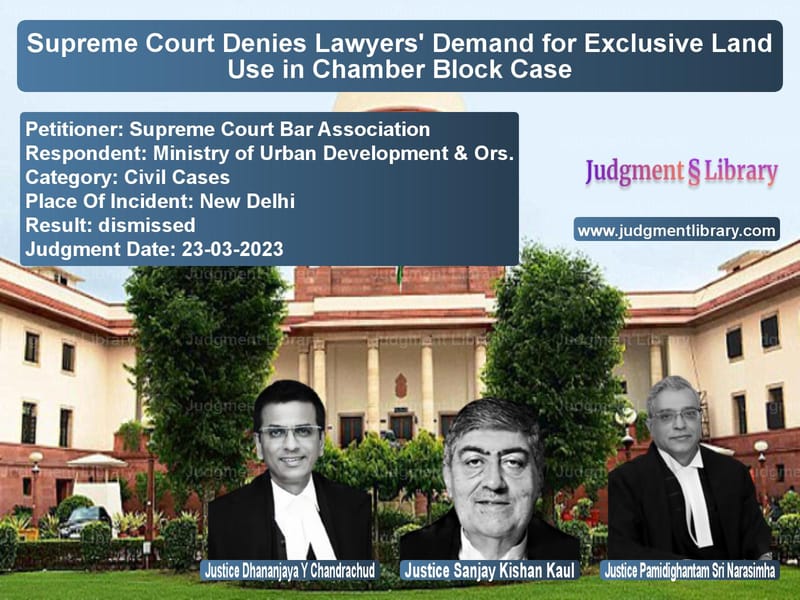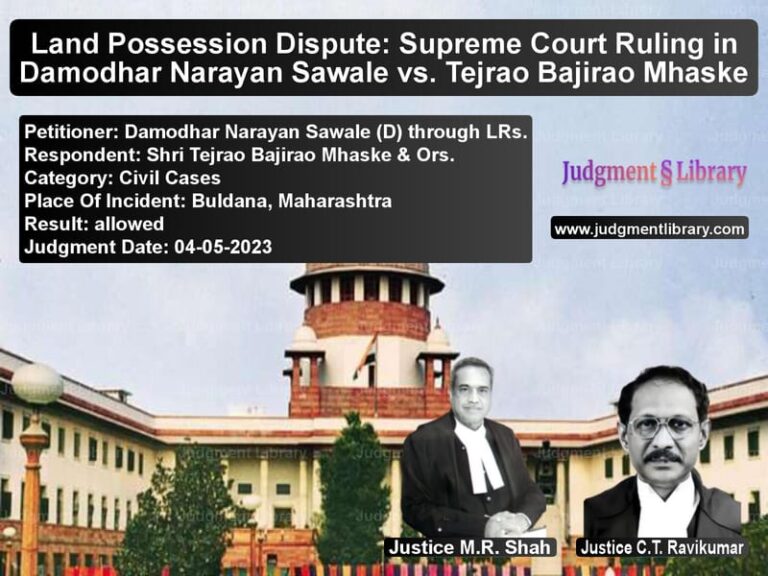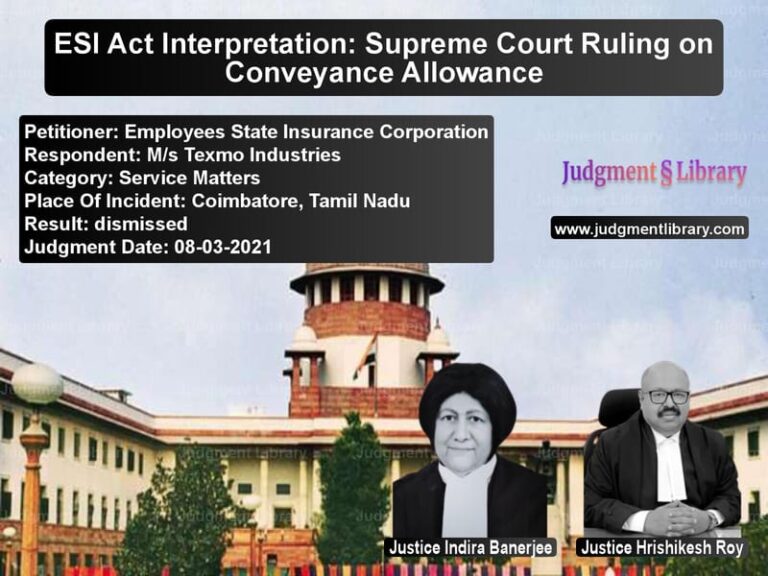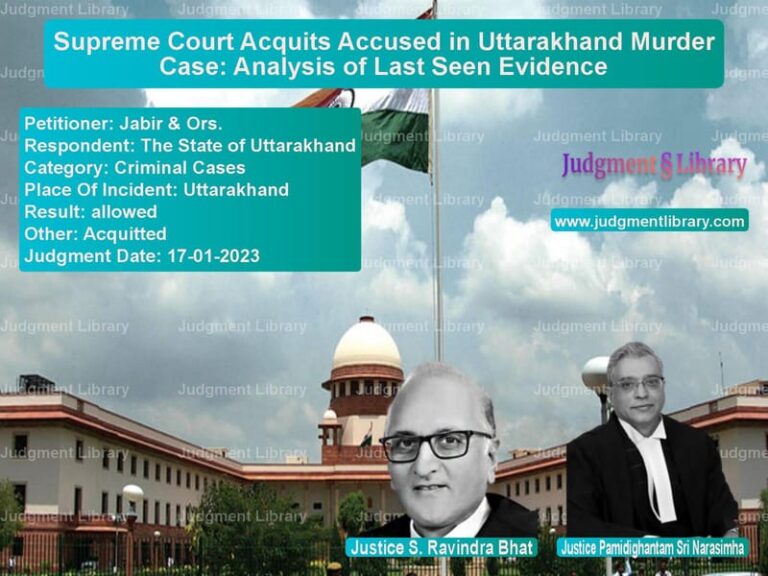Supreme Court Denies Lawyers’ Demand for Exclusive Land Use in Chamber Block Case
The case of Supreme Court Bar Association v. Ministry of Urban Development & Ors. is a landmark judgment regarding the allocation of land for lawyers’ chambers near the Supreme Court of India. The Supreme Court Bar Association (SCBA) filed a writ petition under Article 32 of the Constitution, seeking a directive to convert an entire tract of land measuring 1.33 acres near the ITO into chambers for lawyers. Additionally, SCBA sought the conversion of surrounding buildings, including the Foreign Correspondents’ Club, into chambers for lawyers.
The Supreme Court dismissed the petition, holding that such decisions are administrative and not judicial in nature. The Court emphasized that land allocation must be balanced between various stakeholders, including judges, court staff, litigants, and lawyers. The ruling clarifies the role of the judiciary in managing its administrative affairs and upholds the principle that courts cannot grant reliefs on issues best addressed through administrative mechanisms.
Background of the Case
The petition was filed by the Supreme Court Bar Association (SCBA), citing an urgent need for additional chambers for lawyers practicing in the Supreme Court. According to the SCBA:
- The number of advocates practicing before the Supreme Court has significantly increased, leading to a shortage of chambers.
- A previous allocation of 12.19 acres in the erstwhile Appu Ghar Complex resulted in the construction of only 234 chambers, accommodating 468 lawyers.
- The newly allotted 1.33-acre land near the ITO was the last available tract and should be fully used for constructing lawyers’ chambers.
- The Supreme Court Archives, which was to be built on the same land, could be housed in an alternative location.
The Union Ministry of Urban Development opposed the petition, stating that the land had been allotted specifically for the Supreme Court Archives, and a portion (0.50 acres) had already been earmarked for lawyers’ chambers. The Ministry further argued that such issues should be decided on the administrative side of the Supreme Court.
Arguments by the Parties
Arguments by the Petitioner (SCBA)
The SCBA, represented by senior advocate Mr. Vikas Singh, made the following submissions:
- The entire 1.33-acre land should be used for constructing chamber blocks for lawyers.
- Since the Supreme Court Archives could be housed elsewhere, allocating this land for chambers was the best use of resources.
- The need for chambers is pressing as more lawyers are practicing before the Supreme Court.
- The SCBA has the right to utilize the land allotted to the Supreme Court as its members are an integral part of the justice delivery system.
- The matter requires judicial intervention as it involves fundamental rights under Article 19(1)(g) (right to practice profession) and Article 21 (right to livelihood).
Arguments by the Respondents (Ministry of Urban Development & Others)
The Ministry of Urban Development, represented by the Attorney General of India, countered SCBA’s arguments:
- The land had been allotted specifically for the construction of the Supreme Court Archives, not lawyers’ chambers.
- Decisions regarding land use should be taken administratively and not through judicial orders.
- The needs of other stakeholders, including litigants and court staff, must also be considered.
- The SCBA’s demand for exclusive control over the land was not justified.
Supreme Court’s Legal Analysis
Judicial vs. Administrative Function
The Supreme Court ruled that the allocation of land for administrative purposes falls within the domain of the Court’s internal administration and not its judicial function. The judgment stated:
“We are categorically of the view that it would not be appropriate to entertain a petition under Article 32 of the Constitution seeking a direction that the entirety of the land admeasuring 1.33 acres should be allotted for the construction of a chamber block for lawyers.”
The Court emphasized that such matters should be addressed on the administrative side, ensuring fairness for all stakeholders.
Balancing Stakeholder Interests
The Court observed that lawyers are crucial stakeholders in the judicial system, but so are litigants, judges, and court staff. The needs of all stakeholders must be weighed before making land allocation decisions.
“The Supreme Court of India discharges both judicial and administrative functions. The discharge of its functions implicates diverse stakeholders, including lawyers, litigants, and the staff engaged in activities of the Supreme Court. A holistic view has to be taken on the allocation of available resources by balancing the needs of stakeholders both for the present and the future.”
Rejection of SCBA’s Exclusive Claim
The Supreme Court rejected SCBA’s claim that it had an exclusive right to demand the land for chambers. The Court reiterated that while lawyers are an essential part of the justice system, they do not have overriding rights over judicial infrastructure.
Final Judgment by the Supreme Court
The Supreme Court dismissed the petition, holding that:
- The demand for converting the entire 1.33 acres into chambers for lawyers cannot be entertained on the judicial side.
- Decisions regarding land use should be taken on the administrative side, considering the needs of all stakeholders.
- The Supreme Court would consult with representatives from SCBA, Supreme Court Advocates-on-Record Association (SCAORA), and the Bar Council of India (BCI) to arrive at an administrative decision.
- The demand for converting the entire area around the Supreme Court into a ‘Supreme Court Complex’ for lawyers was not justified.
Impact of the Judgment
The ruling has significant implications for the legal community and judicial administration:
- Reaffirmation of Administrative Authority: The judgment underscores that infrastructure decisions fall within the Supreme Court’s administrative domain.
- Balanced Approach to Legal Infrastructure: The ruling ensures that all stakeholders’ needs are considered, not just those of lawyers.
- Judicial Discipline in Public Resource Allocation: The decision reinforces that courts cannot pass directives on issues better handled through administrative processes.
- Clarity on Land Use in Court Premises: The ruling sets a precedent that land allocation for judicial purposes must follow proper administrative procedures.
Conclusion
The Supreme Court’s decision in Supreme Court Bar Association v. Ministry of Urban Development sets a precedent on judicial discipline in administrative matters. The ruling clarifies that while lawyers play a vital role in the justice system, their demands for exclusive rights over court infrastructure cannot override broader institutional needs. The judgment ensures a balanced approach to infrastructure development within the judiciary.
Petitioner Name: Supreme Court Bar Association.Respondent Name: Ministry of Urban Development & Ors..Judgment By: Justice Dhananjaya Y Chandrachud, Justice Sanjay Kishan Kaul, Justice Pamidighantam Sri Narasimha.Place Of Incident: New Delhi.Judgment Date: 23-03-2023.
Don’t miss out on the full details! Download the complete judgment in PDF format below and gain valuable insights instantly!
Download Judgment: supreme-court-bar-as-vs-ministry-of-urban-de-supreme-court-of-india-judgment-dated-23-03-2023.pdf
Directly Download Judgment: Directly download this Judgment
See all petitions in Legal Malpractice
See all petitions in Public Interest Litigation
See all petitions in Judgment by Dhananjaya Y Chandrachud
See all petitions in Judgment by Sanjay Kishan Kaul
See all petitions in Judgment by P.S. Narasimha
See all petitions in dismissed
See all petitions in supreme court of India judgments March 2023
See all petitions in 2023 judgments
See all posts in Civil Cases Category
See all allowed petitions in Civil Cases Category
See all Dismissed petitions in Civil Cases Category
See all partially allowed petitions in Civil Cases Category







